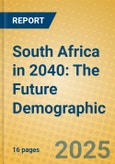South Africa in 2040: The Future Demographic report analyses factors influencing national consumer expenditure. Consumer lifestyles reports include coverage of: population, urban development, home ownership, household profiles, labour, income, consumer and family expenditure, health, education, eating habits, drinking habits, shopping habits, personal grooming, clothing, leisure habits, savings and investments, media, communication, transport and travel and tourism. Use this report to understand the factors influencing a nation's lifestyle choices.
Data coverage: market sizes (historic and forecasts), company shares, brand shares and distribution data.
Why buy this report?
- Get a detailed picture of the Consumer Lifestyles market;
- Pinpoint growth sectors and identify factors driving change;
- Understand the competitive environment, the market’s major players and leading brands;
- Use five-year forecasts to assess how the market is predicted to develop.
Table of Contents
- Introduction
- Key Findings
- Summary
- South Africa and the World in 2040
- Ageing
- Men and Women
- Marriage and Divorce
- Births and Fertility
- Life Expectancy and Deaths
- Health
- Migration
- Diversity
- Urbanisation
- Population Segmentation








